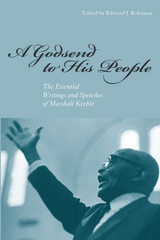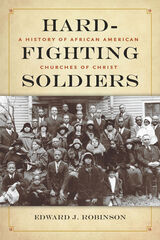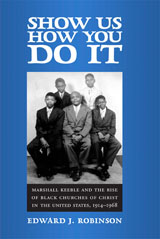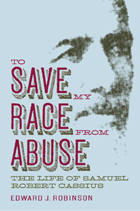4 books about Robinson, Edward J.

A Godsend to His People
The Essential Writings and Speeches of Marshall Keeble
Robinson, Edward J.
University of Tennessee Press, 2008
Marshall Keeble (1878-1968) stands as one of the Church of Christ's most influential and celebrated African American evangelists. His impact was felt throughout the South and well beyond as he helped establish over two hundred churches and baptized approximately forty thousand individuals during his nearly seventy years of ministry. His charismatic and dynamic speaking style earned him a devoted following.
Despite his impact on the religious culture of the South, there has been scant information available about this extraordinary individual-until now. With the his new book, A Godsend to His People, Edward J. Robinson brings to light over forty years of Keeble's writings.
This collection shows the human side of Keeble, revealing his concern for the souls of his faithful followers and the pragmatic way in which he ran his ministry. The sermons and other writings give great insight into the struggles of a prominent African American trying to navigate his way through the challenges of conducting his ministry in the segregated world of the Jim Crow South.
Robinson draws on a variety of sources in which Keeble was published, including the Gospel Advocate and the Christian Echo, as well as lectures Keeble gave to students at Abilene Christian College. Through these pages, the reader will learn more about this articulate, passionate, and intelligent man.
A Godsend to His People is the first scholarly treatment of this evangelist and will appeal to those interested in the history of the Church of Christ and religious studies.
Edward J. Robinson is assistant professor of history and biblical studies at Abilene Christian University. He is the editor of To Lift Up My Race: The Essential Writings of Samuel Robert Cassius and author of To Save My Race from Abuse: The Life of Samuel Robert Cassius.
Despite his impact on the religious culture of the South, there has been scant information available about this extraordinary individual-until now. With the his new book, A Godsend to His People, Edward J. Robinson brings to light over forty years of Keeble's writings.
This collection shows the human side of Keeble, revealing his concern for the souls of his faithful followers and the pragmatic way in which he ran his ministry. The sermons and other writings give great insight into the struggles of a prominent African American trying to navigate his way through the challenges of conducting his ministry in the segregated world of the Jim Crow South.
Robinson draws on a variety of sources in which Keeble was published, including the Gospel Advocate and the Christian Echo, as well as lectures Keeble gave to students at Abilene Christian College. Through these pages, the reader will learn more about this articulate, passionate, and intelligent man.
A Godsend to His People is the first scholarly treatment of this evangelist and will appeal to those interested in the history of the Church of Christ and religious studies.
Edward J. Robinson is assistant professor of history and biblical studies at Abilene Christian University. He is the editor of To Lift Up My Race: The Essential Writings of Samuel Robert Cassius and author of To Save My Race from Abuse: The Life of Samuel Robert Cassius.
[more]

Hard-Fighting Soldiers
A History of African American Churches of Christ
Edward J. Robinson
University of Tennessee Press, 2019
In the first full-length scholarly synthesis of the African American Churches of Christ, Edward J. Robinson provides a comprehensive look at the church’s improbable development against a backdrop of African American oppression. The journey begins with a lesser known preacher, F. F. Carson, in many ways a forerunner in the struggles and triumphs awaiting the preachers and lay people in the congregations to come. Robinson then builds on scholarship treating well-known figures, including Marshall Keeble and G. P. Bowser, to present a wide-ranging history of African American Churches of Christ from their beginnings—when enslaved people embraced the nascent Stone-Campbell Christian Movement even though founder Alexander Campbell himself favored slavery. The author moves on to examine how the churches grew under the leadership of S. R. Cassius, even as Jim Crow restrictions put extreme pressure on organizations of any kind among African Americans.
Robinson’s well-researched narrative treats not only the black male leaders of the church, but also women leaders, such as Annie C. Tuggle, as well as notable activities of the church, including music, education, and global evangelism, thus painting a complete picture of African American Churches of Christ. Through scholarship and compelling storytelling, Robinson tells the two-hundred-year tale of how “black believers survived and thrived on the discarded ‘scraps’ of America, forging their own identity, fashioning their own lofty ecclesiology and ‘hard’ theology, and creating their own papers, lectureships, liturgy, and congregations.” A groundbreaking exploration by a seasoned scholar in American religion, Hard-Fighting Soldiers is sure to become the standard text for anyone researching the African American Churches of Christ.
Robinson’s well-researched narrative treats not only the black male leaders of the church, but also women leaders, such as Annie C. Tuggle, as well as notable activities of the church, including music, education, and global evangelism, thus painting a complete picture of African American Churches of Christ. Through scholarship and compelling storytelling, Robinson tells the two-hundred-year tale of how “black believers survived and thrived on the discarded ‘scraps’ of America, forging their own identity, fashioning their own lofty ecclesiology and ‘hard’ theology, and creating their own papers, lectureships, liturgy, and congregations.” A groundbreaking exploration by a seasoned scholar in American religion, Hard-Fighting Soldiers is sure to become the standard text for anyone researching the African American Churches of Christ.
[more]

Show Us How You Do It
Marshall Keeble and the Rise of Black Churches of Christ in the United States, 1914-1968
Edward J. Robinson
University of Alabama Press, 2008
Marshall Keeble (1878–1968) was the premier evangelist in black Churches of Christ from 1931 until his death in 1968. Born and reared in middle Tennessee, Keeble came under the influence of Preston Taylor, Samuel Womack, and Alexander Campbell, as well as the social influence of Booker T. Washington. In 1914, Keeble committed himself to full-time evangelism and by the 1920s had established himself as a noteworthy preacher. By the time of his death, he reportedly had baptized 40,000 people and had established more than 200 congregations, some of which still flourish today. Show Us How You Do It is the first critical study of Keeble and his evangelical career.
Based on primary sources, Edward Robinson reconstructs the life, public ministry, missionary activities, and the reception of Keeble among Churches of Christ. He also explores Keeble’s relationship with white businessmen and how he secured white support in establishing a large fellowship of African American Churches of Christ in the South. Show Us How You Do It details Keeble’s theology, ethos, and polemics toward other churches. Robinson demonstrates Keeble’s legacy in the labor of his African American co-workers and of the students who attended Nashville Christian Institute.
Of the approximately 2.5 million members of the Churches of Christ in the U.S., an estimated 10 percent are African-Americans, and many in this fellowship can trace their affiliation to Keeble and to those whom he trained.
[more]

To Save My Race from Abuse
The Life of Samuel Robert Cassius
Edward J. Robinson
University of Alabama Press, 2009
The story of a fascinating and important figure in black American religious history
Samuel Robert Cassius was born to a slave mother and a white father in Virginia in 1853 and became a member of the Restorationist Movement (Disciples of Christ) while a coal miner in Indiana. For the rest of his long life (he died in 1931 at age 78), Cassius was an active evangelist, prolific publicist, dedicated leader of black Disciples, and an outspoken and uncompromising opponent of racism in religion and society.
An indefatigable preacher, Cassius ranged throughout the Midwest, California, and the southwestern states, founding and encouraging black Stone-Campbell Restorationist congregations. After entering the Oklahoma Territory in 1891, he worked for three decades as an educator, newspaper editor, social activist, postmaster, and Justice of the Peace. Because he consistently incorporated social and racial issues into his religious writings, Cassius often found himself at odds with whites in the Stone-Campbell Movement, the very people he relied on for monetary support. He advocated a Booker T. Washington-style self-help ethos while at the same time firmly resisting racism wherever he encountered it. Largely invisible in a world dominated by such towering figures as Washington, Frederick Douglass, Ida B. Wells, and W. E. B. DuBois, Cassius lived a life of virtual obscurity beyond the circle of the Stone-Campbell Movement. His story is important because, as a racial militant and separatist, he presaged the schism that would engulf and fracture the Churches of Christ in the 1960s, when blacks and whites went their separate ways and formed two distinct groups in one religious fellowship.
By combing through a plethora of primary sources that Cassius left behind in both religious and nonreligious journals, Edward J. Robinson has successfully reconstructed and recaptured the essence of Cassius’ complex and extraordinary life. This book offers the first full-length study of a man of remarkable attainment despite daily obstacles and resistance.
Samuel Robert Cassius was born to a slave mother and a white father in Virginia in 1853 and became a member of the Restorationist Movement (Disciples of Christ) while a coal miner in Indiana. For the rest of his long life (he died in 1931 at age 78), Cassius was an active evangelist, prolific publicist, dedicated leader of black Disciples, and an outspoken and uncompromising opponent of racism in religion and society.
An indefatigable preacher, Cassius ranged throughout the Midwest, California, and the southwestern states, founding and encouraging black Stone-Campbell Restorationist congregations. After entering the Oklahoma Territory in 1891, he worked for three decades as an educator, newspaper editor, social activist, postmaster, and Justice of the Peace. Because he consistently incorporated social and racial issues into his religious writings, Cassius often found himself at odds with whites in the Stone-Campbell Movement, the very people he relied on for monetary support. He advocated a Booker T. Washington-style self-help ethos while at the same time firmly resisting racism wherever he encountered it. Largely invisible in a world dominated by such towering figures as Washington, Frederick Douglass, Ida B. Wells, and W. E. B. DuBois, Cassius lived a life of virtual obscurity beyond the circle of the Stone-Campbell Movement. His story is important because, as a racial militant and separatist, he presaged the schism that would engulf and fracture the Churches of Christ in the 1960s, when blacks and whites went their separate ways and formed two distinct groups in one religious fellowship.
By combing through a plethora of primary sources that Cassius left behind in both religious and nonreligious journals, Edward J. Robinson has successfully reconstructed and recaptured the essence of Cassius’ complex and extraordinary life. This book offers the first full-length study of a man of remarkable attainment despite daily obstacles and resistance.
[more]
READERS
Browse our collection.
PUBLISHERS
See BiblioVault's publisher services.
STUDENT SERVICES
Files for college accessibility offices.
UChicago Accessibility Resources
home | accessibility | search | about | contact us
BiblioVault ® 2001 - 2024
The University of Chicago Press









